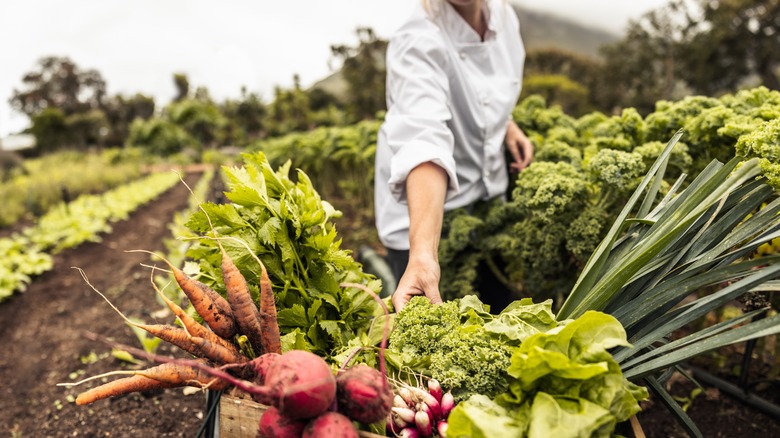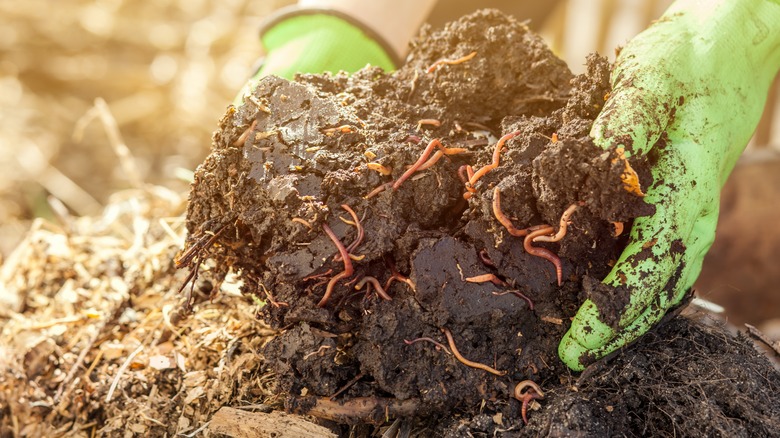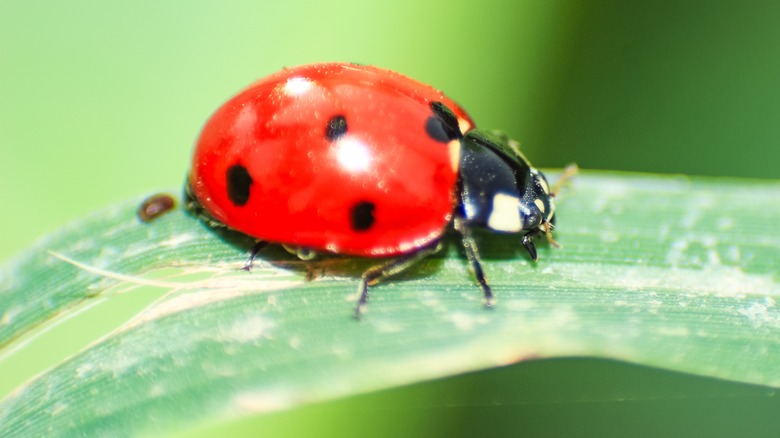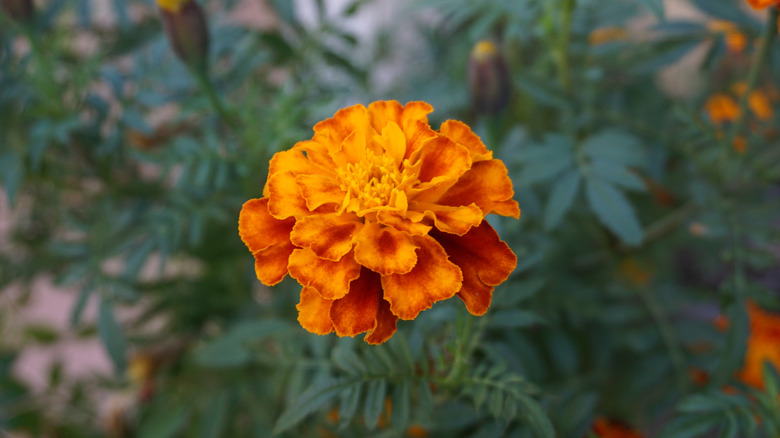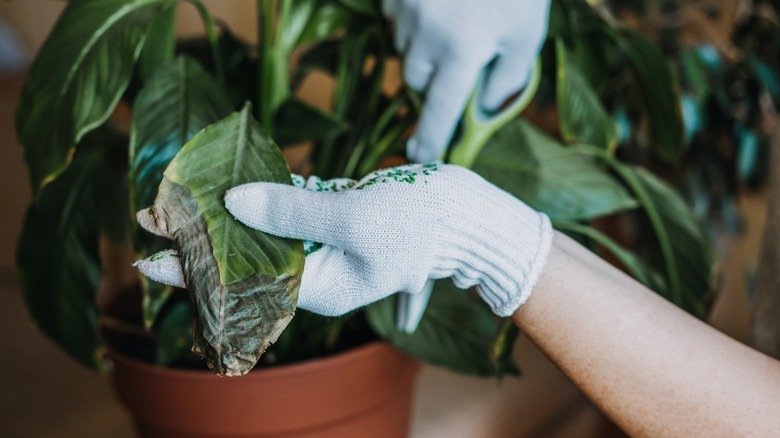Eco-Friendly Ways To Keep Bugs Out Of Your Garden
Whether you're cultivating a small raised bed in your backyard or have larger aspirations for a comprehensive space, pests can be a constant source of annoyance and cause many issues in the garden. While some homeowners might reach for the pesticides the first time they see aphids on the underside of their tomato leaves, chemical solutions to a pest problem are also harmful to the ecosystem you're so diligently working to create.
Chemicals not only damage the plants themselves, but they also kill off helpful insect species that work with you to eliminate threats in the garden. Eco-friendly alternatives, on the other hand, are beneficial for the world around you, and they are also actually more effective over the long term at dealing with typical garden pests. A shift in the way you manage harmful bugs in the garden is not difficult to implement and will ensure that what you do grow is healthy and nutritious.
Maintain healthy soil practices
The first thing that any homeowner must do when reducing their chemical dependency is target the soil. Healthy soil provides the nutrients and moisture conditions that plants across the spectrum require. For this reason, sustainable gardening practices often focus on building and maintaining high-quality dirt.
Building quality soil is a straightforward endeavor that simply requires patience and consistency. Planting clover in your lawn for year-round coverage or adding it as a cover crop in the colder months can be a great starting point. Clover is a nitrogen fixer, capturing it from the air and delivering the nutrient into the soil through its roots. Nitrogen is a key ingredient in the makeup of a plant's chlorophyll and is therefore a crucial additive in any growing environment.
Composting is another effective practice to boost the nutritional value of the soil. The nutrients found in store-bought soil only last a few weeks or months and the plastic packaging of the dirt itself must be disposed of. Composting, on the other hand, is a natural process of returning food waste into viable, rich soil that can be added directly to the garden.
Rotate crops to minimize infestations
Crop rotation is a critical piece of the puzzle for growers looking to improve the yield of their garden. Growing the same crop in the same place season after season reduces the viability of the plants and leads to smaller harvests over time. This diminishing productivity happens as a result of overtaxed soil nutrients, but also because permanent growing positions encourage pest colonies that devour healthy plant matter.
Changing the position of your plants on a seasonal or yearly basis can have a significant impact on predatory insects that prey on the leaves, flowers, and fruits in a garden. Aphids, caterpillars, and harlequins are particular nuisances for leafy vegetation. They tear away at the leaves on a variety of plants, such as cabbage, lettuce, or other leafy greens. In other circumstances, these insects will devour the leaves that a fruit tree or flowering bush requires for photosynthesis. Rotating your crops helps to naturally keep these predatory species at bay through simple physical distance.
Introduce beneficial insects
Perhaps one of the easiest methods of pest control is the use of beneficial insects. Ladybugs, lacewings, beetles, and many other species are natural predators that will eat the pests in your garden. Instead of feasting on the plants themselves, these bugs effectively control the populations of those that do — however, many of the pesticides that homeowners might turn to will kill off beneficial insects as well.
Dr. Charles van Rees noted in an interview with House Digest that pesticides will build up in an environment over time. The "chemicals quickly build up in the bodies of other non-target animals," he noted, eventually killing off the larger, predatory insects and allowing a new surge of pests to invade your garden.
You can purchase ladybugs and other insects online or at a local gardening center. But, remember, they will quickly dissipate or die off if you use chemical pest reduction methods. Introducing beneficial insects into a welcoming environment will improve the odds that they stick around and do the dirty work for you.
Plant species that attract beneficial predators naturally
Because beneficial predators require a thriving habitat just like any other animal, planting a garden that is inviting for them is essential. Local crops are a must in any home gardening endeavor because they provide the necessary habitat. Physical planting combined with healthy predatory species introductions can effectively eliminate the need for chemical interventions.
South Dakota State University Extension suggests planting yarrow (specifically fern-leaf yarrow) to improve the number of predatory species. With the appropriate plant matter in the garden, new beneficial insects will flock to your space and provide the pest-killing addition that you're seeking.
In addition, gardeners can improve the balance of their ecosystem by selecting plants that ward off unwanted pests directly. The Single Gold Marigold is known to reduce the presence of root-feeding nematodes in a garden. Planting crop varieties that make your garden a dangerous place for pests is the next step toward a more eco-friendly growing space.
Integrate roguing techniques in your gardening
Roguing is the removal of dead, dying, infested, or diseased plants. Culling these plants is a critical practice that all gardeners must engage in. South Dakota State University Extension notes that plants communicate with one another and the ecosystem as a whole through pheromone signals. When they are being eaten, or are otherwise under attack, these signals alert other plants in their vicinity to the danger and some may start producing tannins to fend off the threat.
Nature has a way of constantly finding means of rejuvenation, and so a dying plant will often become a feeding ground for certain pests. Removing plant material that acts as a beacon for pests will save your healthy plants from becoming a feast as well. Generally speaking, this material can make for a positive addition to the compost pile. This gives you a means of recycling the nutrients and plant mass that will give back to your garden in the future.
